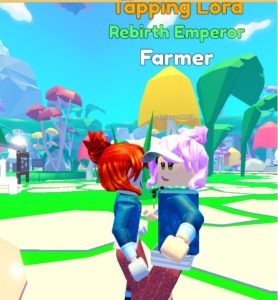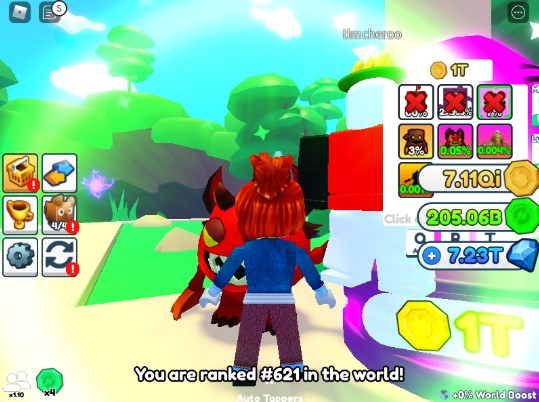My kids recently discovered a Roblox game called “Tapping Simulator.” I started playing with them for fun and to help since I have a certain facility for video games.
“Tapping Simulator” is a clicker game involving the collection of flowers, pets, eggs and islands that uses the freemium model and allows the user to decide how they play. My youngest child can run and jump, then shriek “It works!” when she enters a portal and the screen changes (as it always does).
Days ago, when I was playing, the game told me I had reached the leaderboard — the top 1,000 players worldwide, and it occurred to me that the game and my kids’ approach hold plenty of leadership lessons.
Be cautious with niche improvements
Cool features abound in this game, and they’re all fun eventually. But great updates change your goals, so at the start, you only need the basics. Otherwise, eschewing the basics for niche improvements can limit your growth.
Many business leaders agree, noting that sticking with your original product or service can create customer loyalty, increase profits and help you reach your goals faster.
Different approaches are valid
I approach much of life mechanically: How does this thing work, and how can I maximize it? Thus, I find efficiencies other people might not, and that can be fun and useful.
My kids are not mechanical, which is fine. So when my oldest child started playing this game, she went running and jumping around, looking at random flowers and clouds and islands. I tried to get her to taptaptaptaptap along with Daddy, but that bored her, so she continued jumping randomly. About half an hour later, she discovered a tip about advancing in the game without buying something. It’s an area of the game I hadn’t seen because I was too busy taptaptaptaptapping in another area. And it’s proof that jumping/climbing can be fun and useful.
Her discoveries improved both our shared gameplay and my solo grinding, and she discovered them because she was doing her own thing, which didn’t need to be the same approach as mine.
Being willing to embrace a different approach translates well to business. As entrepreneur and sales professional Nate Nasralla wrote in Sales Hacker, “If you want uncommon results … then you’ll need to develop a set of uncommon sales practices.”

It’s OK to talk to competitors
Learning new things on your own can be great. And when the “Tapping Simulator” developer team adds content to the game, I explore it. But I also look to other players for help. Within hours of most updates, people usually have figured things out and post about it on YouTube, in online game chats and in apps such as Discord.
Free help isn’t always accurate, but a smart person can vet information and sources and act accordingly. Plus, positive competitive relationships can be beneficial in games, business and life.
New things aren’t always good
As I write this, we are two hours into the game’s latest update: a new egg, hatching new animals.
New things are fun. Shiny. Exciting. People want them and set aside time, money and other resources for them. They get particular about them. And they can get angry if they’re disappointed by them.
I’m not a trusting person, so when I see something new, I assume it’s secretly bad. That way, I’m pleasantly surprised by the good aspects and able to deal factually with the bad aspects.
When this new egg came along, I quickly found the secretly bad thing: It was worse than the last new one.
How many times has that happened in real life, providing handy leadership lessons? If a mobile phone’s newest generation had a weaker processor, a shorter battery life or a smaller screen, why change? Sometimes it’s best to stick with what you have.
Long-term versus short-term thinking
The game rewards players in the long term for hatching rare pets, but that pursuit is rarely a wise short-term investment. So as a player, you must determine whether the reward outweighs the risk. Leveling pets is a similarly fraught short-term situation (weaker new pet versus stronger old pet), so I use math to figure out when or if a certain new pet will ever be better than what I have. If it won’t, I don’t use it.
As Matt Weiss of Rind snacks has told CNBC, taking a long-term view helps younger entrepreneurs and workers “build resilience and accumulate a wide range of knowledge, skills and experience,” setting them up for “lasting success.”

Don’t forget the fundamental leadership lessons
Above all, make sure you already know these leadership lessons:
- Understand the root. On the surface, “Tapping Simulator” is a game about tapping and pets. But on a deeper level, it’s a math game with a pet-hatching skin. The developers could change the pet icons to food icons and it would still be a math game. So while my children focus on pegasuses or bunnies or flowers, I focus on finding the best growth-focused math and maximizing my gains from it.
- Don’t avoid the hard/smart work. Freemium games operate on the concept of “Hey, this is fun, but it’d be more fun if I paid for these extra features.” But you could buy all those features and never catch up to me if you didn’t first understand what you were doing and weren’t improving with what you already have. Whether you’re bootstrapping a business or striving to get ahead as an employee, “dedication, sound work ethics, and pure single-mindedness” point the way to success in money, market share and more.
- Focus on what you are, not what you aren’t. I don’t pay to play “Tapping Simulator“ and therefore won’t ever be the top player. I focus on playing my game, having fun with my kids, learning and appreciating what I can do with less. Similarly, a small business probably can’t offer employees the pay or other financial motivations of larger rivals. But it can offer what the bigger ones can’t: a human connection.
Patrick Hopkins is a copy editor/writer at SmartBrief.
Opinions expressed by SmartBrief contributors are their own.
_________________________
Subscribe to SmartBrief’s FREE email newsletter on leadership. It’s among SmartBrief’s more than 250 industry-focused newsletters.
